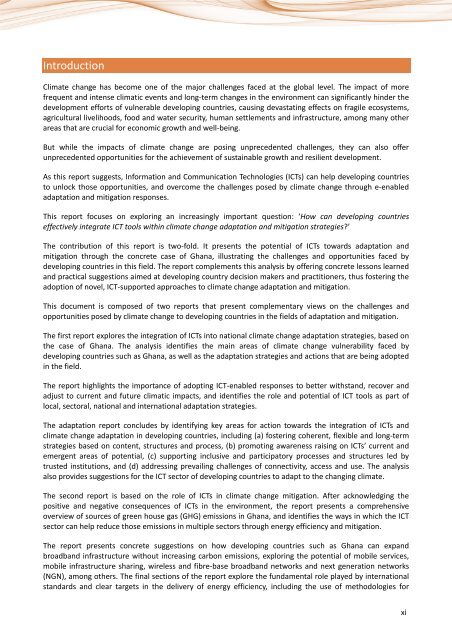Information and communication technologies (ICTs) and ... - ITU
Information and communication technologies (ICTs) and ... - ITU
Information and communication technologies (ICTs) and ... - ITU
You also want an ePaper? Increase the reach of your titles
YUMPU automatically turns print PDFs into web optimized ePapers that Google loves.
Introduction<br />
Climate change has become one of the major challenges faced at the global level. The impact of more<br />
frequent <strong>and</strong> intense climatic events <strong>and</strong> long-term changes in the environment can significantly hinder the<br />
development efforts of vulnerable developing countries, causing devastating effects on fragile ecosystems,<br />
agricultural livelihoods, food <strong>and</strong> water security, human settlements <strong>and</strong> infrastructure, among many other<br />
areas that are crucial for economic growth <strong>and</strong> well-being.<br />
But while the impacts of climate change are posing unprecedented challenges, they can also offer<br />
unprecedented opportunities for the achievement of sustainable growth <strong>and</strong> resilient development.<br />
As this report suggests, <strong>Information</strong> <strong>and</strong> Communication Technologies (<strong>ICTs</strong>) can help developing countries<br />
to unlock those opportunities, <strong>and</strong> overcome the challenges posed by climate change through e-enabled<br />
adaptation <strong>and</strong> mitigation responses.<br />
This report focuses on exploring an increasingly important question: ‘How can developing countries<br />
effectively integrate ICT tools within climate change adaptation <strong>and</strong> mitigation strategies?’<br />
The contribution of this report is two-fold. It presents the potential of <strong>ICTs</strong> towards adaptation <strong>and</strong><br />
mitigation through the concrete case of Ghana, illustrating the challenges <strong>and</strong> opportunities faced by<br />
developing countries in this field. The report complements this analysis by offering concrete lessons learned<br />
<strong>and</strong> practical suggestions aimed at developing country decision makers <strong>and</strong> practitioners, thus fostering the<br />
adoption of novel, ICT-supported approaches to climate change adaptation <strong>and</strong> mitigation.<br />
This document is composed of two reports that present complementary views on the challenges <strong>and</strong><br />
opportunities posed by climate change to developing countries in the fields of adaptation <strong>and</strong> mitigation.<br />
The first report explores the integration of <strong>ICTs</strong> into national climate change adaptation strategies, based on<br />
the case of Ghana. The analysis identifies the main areas of climate change vulnerability faced by<br />
developing countries such as Ghana, as well as the adaptation strategies <strong>and</strong> actions that are being adopted<br />
in the field.<br />
The report highlights the importance of adopting ICT-enabled responses to better withst<strong>and</strong>, recover <strong>and</strong><br />
adjust to current <strong>and</strong> future climatic impacts, <strong>and</strong> identifies the role <strong>and</strong> potential of ICT tools as part of<br />
local, sectoral, national <strong>and</strong> international adaptation strategies.<br />
The adaptation report concludes by identifying key areas for action towards the integration of <strong>ICTs</strong> <strong>and</strong><br />
climate change adaptation in developing countries, including (a) fostering coherent, flexible <strong>and</strong> long-term<br />
strategies based on content, structures <strong>and</strong> process, (b) promoting awareness raising on <strong>ICTs</strong>’ current <strong>and</strong><br />
emergent areas of potential, (c) supporting inclusive <strong>and</strong> participatory processes <strong>and</strong> structures led by<br />
trusted institutions, <strong>and</strong> (d) addressing prevailing challenges of connectivity, access <strong>and</strong> use. The analysis<br />
also provides suggestions for the ICT sector of developing countries to adapt to the changing climate.<br />
The second report is based on the role of <strong>ICTs</strong> in climate change mitigation. After acknowledging the<br />
positive <strong>and</strong> negative consequences of <strong>ICTs</strong> in the environment, the report presents a comprehensive<br />
overview of sources of green house gas (GHG) emissions in Ghana, <strong>and</strong> identifies the ways in which the ICT<br />
sector can help reduce those emissions in multiple sectors through energy efficiency <strong>and</strong> mitigation.<br />
The report presents concrete suggestions on how developing countries such as Ghana can exp<strong>and</strong><br />
broadb<strong>and</strong> infrastructure without increasing carbon emissions, exploring the potential of mobile services,<br />
mobile infrastructure sharing, wireless <strong>and</strong> fibre-base broadb<strong>and</strong> networks <strong>and</strong> next generation networks<br />
(NGN), among others. The final sections of the report explore the fundamental role played by international<br />
st<strong>and</strong>ards <strong>and</strong> clear targets in the delivery of energy efficiency, including the use of methodologies for<br />
xi

















